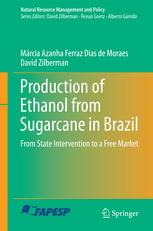

Most ebook files are in PDF format, so you can easily read them using various software such as Foxit Reader or directly on the Google Chrome browser.
Some ebook files are released by publishers in other formats such as .awz, .mobi, .epub, .fb2, etc. You may need to install specific software to read these formats on mobile/PC, such as Calibre.
Please read the tutorial at this link: https://ebookbell.com/faq
We offer FREE conversion to the popular formats you request; however, this may take some time. Therefore, right after payment, please email us, and we will try to provide the service as quickly as possible.
For some exceptional file formats or broken links (if any), please refrain from opening any disputes. Instead, email us first, and we will try to assist within a maximum of 6 hours.
EbookBell Team

5.0
90 reviewsThe success of Brazil in the large-scale production and use of fuel ethanol has been widely discussed and analyzed by other countries interested in adopting policies designed to encourage the use of biofuels. Within this context, certain questions arise: Could the Brazilian experience be replicated in other countries? What were the conditions that enabled the creation of the Brazilian Proálcool (National Ethanol Program and what lessons can be learned? To examine these issues, it is important to understand the functioning of the key, interconnected markets (those for sugarcane, sugar and ethanol), which, from their inception, were the objects of extensive government intervention until 1999. Two main conditions enabled the creation of Proálcool: robust production of sugarcane and sugar (tightly regulated by the government, which applied the numerous regulations then in place); and the military regime that was in place at the time, whose decision-making and enforcement powers were quite broad, facilitating the carrying out of the necessary actions, as well as making it easier to coordinate the activities of the various stakeholders and sectors involved. This book increases understanding of the functioning of the sugarcane supply chain in Brazil, not only during the phase of government intervention but also in recent years (in the free-market environment). The lessons, positive and negative, gleaned from the Brazilian experience can contribute to reflection on and the development of alternative modalities of biofuel production in other countries, making the book of interest to scholars and policy-makers concerned with biofuel and renewable resources as well as economic development.